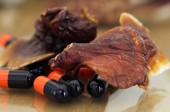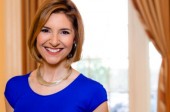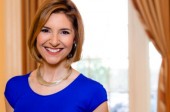Dr. Darria speaks with Alzheimer’s expert, Lori La Bey, to answer listeners questions about the disease.
Additional Info
- Segment Number 5
- Audio File sharecare/1543sc2a.mp3
- Featured Speaker Lori La Bey
- Guest Website Alzheimer's Speaks
- Guest Facebook Account https://www.facebook.com/Alzheimers-Speaks-127504814385/timeline/
- Guest Twitter Account @AlzSpks
-
Guest Bio
 Lori La Bey is a passionate advocate who searches for ways to shift our dementia care culture from crisis to comfort. She is the host of Alzheimer’s Speaks Radio and the webinar series Dementia Chats, and founded the advocacy group Alzheimer's Speaks. She was recognized by Sharecare and Dr. Oz. as the #1 Influencer Online for Alzheimer's.
Lori La Bey is a passionate advocate who searches for ways to shift our dementia care culture from crisis to comfort. She is the host of Alzheimer’s Speaks Radio and the webinar series Dementia Chats, and founded the advocacy group Alzheimer's Speaks. She was recognized by Sharecare and Dr. Oz. as the #1 Influencer Online for Alzheimer's.
- Length (mins) 10
- Waiver Received No
- Host Darria Long Gillespie, MD, MBA
The UN's Food and Agricultural Organization hosts World Food Day every year to raise awareness for the plight of the hungry and malnourished around the world.
Additional Info
- Segment Number 4
- Audio File sharecare/1542sc2c.mp3
- Featured Speaker Marco Knowles, Economist
- Guest Twitter Account @FAOWFD
- Guest Bio Marco Knowles is a socio-economist working for the Agricultural Development Economics Division in FAO. He collaborated with the FNPP Food security Theme in Bhutan as an Advisor of the Netherlands Development Organisation. His areas of expertise include food security policy assistance and vulnerability analysis.
- Length (mins) 10
- Waiver Received No
- Host Darria Long Gillespie, MD, MBA
Author, mother, entrepreneur, and activist Tracy Nicole is also a breast cancer survivor. She joins Dr. Darria to share her story.
Additional Info
- Segment Number 2
- Audio File sharecare/1542sc2b.mp3
- Featured Speaker Tracy Nicole, Author
- Organization Beneath the Petals
- Guest Website Tracy Nicole Clothing
- Guest Facebook Account https://www.facebook.com/tracynicoleclothing
- Guest Twitter Account @tracynicoleatl
-
Guest Bio
 Tracy Nicole is a designer, author, mother, entrepreneur, activist and a breast cancer survivor. Tracy has more than a decade of experience in the fashion industry and wrote the novel, Who Said Peaches Were Perfect? She took her breast cancer survival journey and used it as inspiration to launch a new collection of Tracy Nicole Clothing, including pieces made especially with breast cancer patients in mind. She has also recently been honored as a Model of Courage for Ford Motor Company.
Tracy Nicole is a designer, author, mother, entrepreneur, activist and a breast cancer survivor. Tracy has more than a decade of experience in the fashion industry and wrote the novel, Who Said Peaches Were Perfect? She took her breast cancer survival journey and used it as inspiration to launch a new collection of Tracy Nicole Clothing, including pieces made especially with breast cancer patients in mind. She has also recently been honored as a Model of Courage for Ford Motor Company.
- Length (mins) 10
- Waiver Received No
- Host Darria Long Gillespie, MD, MBA
Dr. Darria speaks with internist and Sharecare Advisory Board member, Dr. Robin Miller, about the health benefits of medicinal mushrooms.
Additional Info
- Segment Number 5
- Audio File sharecare/1542sc2a.mp3
- Featured Speaker Robin Miller, MD
- Book Title Kids Ask the Doctor
- Guest Website Sharecare: Dr. Robin Miller
- Guest Twitter Account @RMillerMD
-
Guest Bio
 Dr. Robin Miller, Sharecare Editorial Advisory Board Member, currently practices Internal Medicine and serves as the medical director of Triune Integrative Medicine, a highly innovative Integrative Medicine clinic in Medford, Oregon. She has produced the award-winning health series, Is There a Doctor in the House, which is shown nationwide on the GE-sponsored Patient Channel, and is the author of Kids Ask the Doctor and the co-author of The Smart Woman's Guide to Midlife and Beyond: A No-Nonsense Approach to Staying Healthy after 50.
Dr. Robin Miller, Sharecare Editorial Advisory Board Member, currently practices Internal Medicine and serves as the medical director of Triune Integrative Medicine, a highly innovative Integrative Medicine clinic in Medford, Oregon. She has produced the award-winning health series, Is There a Doctor in the House, which is shown nationwide on the GE-sponsored Patient Channel, and is the author of Kids Ask the Doctor and the co-author of The Smart Woman's Guide to Midlife and Beyond: A No-Nonsense Approach to Staying Healthy after 50.
- Length (mins) 10
- Waiver Received No
- Host Darria Long Gillespie, MD, MBA
National Kale Day founder, Dr. Drew Ramsey, shares the origin of National Kale Day, why he champions this vegetable, and how and why to include more brain foods like kale in your diet.
Additional Info
- Segment Number 4
- Audio File sharecare/1541sc2c.mp3
- Featured Speaker Drew Ramsey, MD
- Organization National Kale Day
- Book Title The Happiness Diet
- Guest Website Drew Ramsey, MD
- Guest Twitter Account @nationalkaleday
-
Guest Bio
 Dr. Drew Ramsey is a psychiatrist, author, and farmer. He is one of psychiatry’s leading proponents of using dietary change, cutting-edge nutritional research, and the latest brain science to help people balance moods, sharpen brain function and live their happiest, healthiest lives. An assistant clinical professor of psychiatry at Columbia University College of Physicians and Surgeons in New York City, his clinical work focuses on the treatment of depression and anxiety.
Dr. Drew Ramsey is a psychiatrist, author, and farmer. He is one of psychiatry’s leading proponents of using dietary change, cutting-edge nutritional research, and the latest brain science to help people balance moods, sharpen brain function and live their happiest, healthiest lives. An assistant clinical professor of psychiatry at Columbia University College of Physicians and Surgeons in New York City, his clinical work focuses on the treatment of depression and anxiety.
- Length (mins) 10
- Waiver Received No
- Host Darria Long Gillespie, MD, MBA
Dr. Michael Finkelstein, the “Slow Medicine Doctor,” describes his approach to wellness and how listeners can use Slow Medicine to improve their health.
Additional Info
- Segment Number 2
- Audio File sharecare/1541sc2b.mp3
- Featured Speaker Michael Finkelstein, MD
- Book Title Slow Medicine: Hope and Healing for Chronic Illness
- Guest Website The Slow Medicine Doctor
- Guest Facebook Account https://www.facebook.com/SlowMedicineDoctor
- Guest Twitter Account @SlowMedicineDr
-
Guest Bio
 Dr. Michael Finkelstein, The Slow Medicine Doctor®, is the author of Slow Medicine: Hope and Healing for Chronic Illness, endorsed by Andrew Weil, MD and Mehmet Oz, MD.
Dr. Michael Finkelstein, The Slow Medicine Doctor®, is the author of Slow Medicine: Hope and Healing for Chronic Illness, endorsed by Andrew Weil, MD and Mehmet Oz, MD.
Dr. Finkelstein is the founder and medical director of SunRaven: The Home of Slow Medicine; he is an adjunct professor at SUNY Binghamton; he has been featured in top media outlets including the New York Times and CNN; he has presented at leading venues including GE Corporation and Omega Institute; and he blogs on the topic of Slow Medicine for the Huffington Post.
Dr. Finkelstein was trained at premier institutes for both conventional and integrative medicine, and he is the recipient of numerous distinctions. Drawing from his diverse medical expertise, Dr. Finkelstein offers both a micro and macro point of view on today’s healthcare needs and challenges, and he provides a tried and-true solution for healing individual patients and the medical system as a whole: Slow Medicine. -
Transcription
Sharecare is the leading online health and wellness engagement platform providing millions of consumers with a personal, results oriented experience by connecting them to the most qualified health resources and programs they need to improve their health. It’s time now for Sharecare Radio on RadioMD.com. Here’s your host, Dr. Darria.
DR. DARRIA: Hi. Welcome back. It’s Dr. Darria. First off, what do you know about slow medicine? What does that mean to you? To answer that question, I have with me Dr. Michael Finkelstein, also known as “the slow medicine doctor.” He is the author of the book Slow Medicine – Hope and Healing for Chronic Illness and the Founder and Medical Director of Sun Raven, the home of Slow Medicine. He’s going to tell us what it is and why this is important for our health. Dr. Finkelstein, thank you for joining us.
DR. FINKELSTEIN: It’s a pleasure to be with you.
DR. DARRIA: Tell me first, what got you interested in this concept of slow medicine in the first place and the transition from conventional medicine.
DR. FINKELSTEIN: I was practicing internal medicine as I was trained for many years and realizing that, very often, I thought my advice was really good but people weren’t getting better quite as well as I had hoped or they had hoped. It got to a point in my own life when I turned 40, where my blood pressure was starting to rise and somebody said to me, “Michael, I think you are going to need a medication”. It struck me that a question that my patients have been asking me, “Isn’t there something else?” was a really good question. It got me to think about what was the limits and the limitations of Western medicine – great for emergencies, great for life-threatening things but for the chronic conditions in which we live – the stuff that happens every day--there may be a better way. So, I started to explore that and realized that we are actually all experiencing a common syndrome, which I would call “sympathetic overdrive”--this fight or flight response in a locked-on position. The fast-fast-fast world and how it affects us. That leads to a whole bunch of cellular metabolic phenomenon that underlies the root cause of many of the things that ail us. Therefore, the treatment is to reverse that or to pause that which is to promote the parasympathetic nervous system, which in a word is “slow”. I think what we need is slow.
DR. DARRIA: Interesting. You’re right. We all run around with such high levels of stress and the impact of that on our health. So, you’re turning that on its head, effectively, with slow medicine.
DR. FINKELSTEIN: Yes, because stress produces that fight or flight response. In a way, it was really designed beautifully to help us really flee from a bear behind the tree.
DR. DARRIA: Right.
DR. FINKELSTEIN: But in our world now, a lot of what scares us that way is virtual. It’s not necessarily really happening in our lives. We see images of people being hurt or threatened or have concepts and concerns about things that are far away, yet our body responds with this fight or flight response. Locked on, it is not good for us. We do need something to deal with that.
DR. DARRIA: You’re right. It’s so true. Our brain hasn’t really evolved from the same fight or flight of “a tiger is chasing me I have to run” versus the challenges that we see from work or something that we see on TV which are not the same mortal threats as a tiger chasing me and not a way to live.
DR. FINKELSTEIN: Our physiology is wired in such a way that it really needs to protect us from mortal threats. Our lives are more complicated. They are different from what they used to be.
DR. DARRIA: Yes. This is for sure. What is the slow medicine approach to health?
DR. FINKELSTEIN: I start off often asking people how they define health because if we follow our culture’s guidance on this with conventional medicine, which is that it’s largely the physical measurements and the parameters that doctors talk to us about, we limit ourselves. Health, to me, is an assortment of certain phenomenon that are interrelated; our physical body, for sure, but how it relates to our mental and emotional states; ow it relates to our relationships; our life’s purpose and how our relationships and our body and our mind actually help us pursue something that is meaningful that makes all of this sensible and allows us tolerate the challenges. To me, health is a functional state of being that allows us to live our lives well.
DR. DARRIA: You’re right. Health isn’t just the measure of your blood pressure or your cholesterol. I love that. It’s a functional state of being. What is the first step when you see a patient and you really want to take them through this concept? What are the first questions that you ask them?
DR. FINKELSTEIN: I explore with them the different facets of their life because they all interrelate, they are all connected. While the physical body may be the dominant concern that most of my patients come to me with, I try to put that in the context of what else is going on in their lives. I start off by asking them a series of questions, essentially taking an inventory with them about the other things that are going on – their relationships, their work, how they sleep, how they feel, how they deal with emotion, what they are doing on a day to day basis with their time, what they put in their bodies. All those things are relevant--not always because they are always a problem for people but I look for the opportunity to bring things back together. I look for the low-hanging fruit. I look for the stuff that they can do something about. I try to build back their strength by reconnecting those dots.
DR. DARRIA: I love that you mention so many of those things, especially relationships. At Sharecare we have the real age test and we have found, just like you said, that relationships and having those strong social relationships truly impacts how long somebody lives and their lifespan. I want to hear more from you about that about that connection.
DR. FINKELSTEIN: We are social beings by nature. Much of why we want to live, what interests us, what we care about, is because it has to do with other people. Either it’s our intimate relationships, our familial relationships, relationships we have with people who are working side by side with us that are doing something meaningful. We want a good body so that we can continue to do that for a long time. The idea is that we know that in the best scenarios, those relationships support us, they feed us, they nurture us and they encourage us. Then, there are those other set of relationships that are toxic; that deplete us. To be healthy, one needs to cultivate the positive relationships and do something with those that are drawing away from us. The slow medicine approach, then, helps people do both and to get stronger from within. Ultimately, the relationship with self is where we start which is, why do you deserve to be healthy? What is going to make a difference in terms of how you feel? What is going to keep you in alignment with what you know is good for you?
DR. DARRIA: Really looking at those primary drivers for health. You talk about living from the heart. What do you mean by that? Is that referring to what you are discussing?
DR. FINKELSTEIN: Very much because people need a certain amount of energy to do this sort of work. It’s easy to pop a pill.
DR. DARRIA: Yes.
DR. FINKELSTEIN: On the other hand, if I’m going to make changes in my life: let’s say, I’m going to change the job that I go to every day because I can’t stand it and its really abusive or hurting me or not supporting me. That’s a big change.
DR. DARRIA: That’s a lot harder. Yes.
DR. FINKELSTEIN: One needs to find energy to make such a decision work for them. The energy comes from our passion, from our purpose. That’s the heart. The heart, literally, is in the center of our body. It also is in the center energetically if you look at it from systems like Ayurveda and Eastern medicine and the connection between the upper zones and the lower zones. It’s where the mind, the emotions and the purpose meet the body. If we come from that place, we can draw on the greatest strength. If we do things that follow our heart, we’re going to be at our best. I can tell you to exercise and you can go to a gym and you can carry sandbags around the room. But, if I told you to carry those sandbags to build a dyke to save a big city from a flood, the energy you would have for those two things would be very different because your heart would likely be into this motivational and this meaningful work – not just exercise. Now it’s real. Think of the difference of energy that you have with the heart working versus the brain.
DR. DARRIA: That’s a fascinating metaphor and it gets to even those stories that you hear of, if you ask some woman to lift up something heavy or push a car, she would say, “I can’t”. But then, you hear stories of mothers, if their child is trapped by something, they have these super human strength feats to save their child. It gets to, if it’s coming from your heart, you have that drive to do that.
DR. FINKELSTEIN: That’s why my subtitle is, Hope and Healing. There’s hope because we see that, in extraordinary circumstances aligned well, people have great resources and great energy and they can do things they may not have thought they could do on a typical day. My work is to help people find those resources; to find that inner strength, which is from the heart--the real meaning of what they are doing. If a doctor tells you to get off the couch, you might do that if they scare you but, if you want to play with your grandchildren on the floor until you’re 99 years old, that’s another reason you’ll get off the couch. That will move more people than just being frightened by a physician’s statement.
DR. DARRIA: Far more. So true. How can our listeners start to live from the heart, as you talk about? What are some steps?
DR. FINKELSTEIN: It’s very important to look at what we do on a day-to-day basis and try to, like I said, take that inventory of what’s working. What really feels right? Where do you have the most energy? What do you do where you are just sort of going through the motions where you don’t feel so energetic? Tease that out a little bit. Essentially, the first rule is to do more of the things that feed you, that fuel your energy, and do less of the things that don’t. When you get to the point where it’s your job, or your marriage, or something that needs to change which can be daunting, rather than just jump into it before you are ready, you need to prepare yourself for that climb. You need to get in shape. That’s where you need to take care of your body. That’s where you need to take care of your body and mind. That’s where you need to develop community relationships and reconnect yourself to the nature world, meaning the rhythms and cycles of nature, like going to sleep when it’s dark and resting one day a week. These are things that find our way through the heart to actually get healthier and stronger. It’s that initial assessment--what really feels right to us. I can wake up at five o’clock in the morning when I’m going to go visit my son in New Orleans. On a typical day if you told me to get up at five o’clock in the morning, I would drag out of bed.
DR. DARRIA: Yes.
DR. FINKELSTEIN: We have to do things we love. That’s the key to any successful plan.
DR. DARRIA: That is such a fascinating take on it. You’re right. Our motivation behind why we are doing something is the difference between jumping out of bed and hitting that snooze button – literally and metaphorically.
DR. FINKELSTEIN: Everyone has that in their own life. They have examples where they see – same me, same diet, same nonsense going on in my life but if I have a good reason to wake up I get out of bed much differently than if there is not a good reason. What creates that shift? It is a mental and emotional component. That’s the heart component. That’s where the emotion and mind meets the body. That’s why that is such a key place. That’s why my work really is centered around what do people love. I don’t want to give them arbitrary advice and recommendations. I want to hear from them. I want to know who they are. I want them to look, maybe, closer in the mirror to see themselves, to love themselves, to appreciate themselves and then to come from that place.
DR. DARRIA: Step one is to really look at what you love.
DR. FINKELSTEIN: Yes.
DR. DARRIA: What gets you jumping out of bed.
DR. FINKELSTEIN: Yes.
DR. DARRIA: I love that. I want to move on from relationships a little bit to fulfillment. You talk about how the lack of fulfillment is kind of at the root of a lot of our unhealthiness. How can you find more of that? I think that kind of builds on what we’ve been talking about – and find more of that in your own life?
DR. FINKELSTEIN: It is all related, just as you said. When you think of the word “fulfillment” I would use the word nourishment to elucidate this concept further. We can feed ourselves physically but there is emotional nourishment we need and spiritual nourishment. When we think of fulfillment, the ideal is to combine them. You know people eat emotionally. We talk about that all the time. So, they are hungry for something – not necessarily food but for connection, for relationships. They are feeling lonely or isolated or maybe angry. They look for something to feed them. Now, instead of writing and being creative and being artistic they go for the Hagan Daaz. This is what we see. If we can find ways of feeding and nourishing our emotional and spiritual self and taking care of our body, we wind up in a synergistic way of feeling full, feeling vital and feeling happy. That nourishment trickles down on every level, including every single one of our cells which we need to be strong and feel good and have our immune system be healthy and get through life with minimal disease and inflammation. Fulfillment is just another way of saying “how do we feed ourselves and what do we need to nourish?”
DR. DARRIA: I guess, step one is finding what you love and step two for this is fulfillment and really seeking that out and filling yourself with that.
DR. FINKELSTEIN: Part of that is to take out the garbage, too. You need room to fill. If our mind is occupied with all sorts of things that are preoccupying us: stress, anxiety, irritation, there’s no room potentially for love to flow in. That’s why people have such challenges in relationships. Part of what we need to do is let go of some stuff. We need to work things through. We need to process them. We need creative ways of doing that as well. Similarly, our bodies can accumulate plenty of toxins through what we ingest and breath and drink. Every once in a while, we need to promote the detoxification mechanisms that exist but we can do better than just hoping that they will do their own work by themselves. Spiritually, we need, I think, very much to connect with something greater than ourselves; otherwise, it sort of gets routinized, this life. The question of what happens at the end of life and after life. Without really attending to that, I think we wind up sort of feeling a little down and depressed. We want to know there is a great future even, maybe, through our whole lives and even afterwards.
DR. DARRIA: It’s so true. You had mentioned when we get so overwhelmed by stressful things and anxieties, I think all of us would say, “Okay that sounds great. How do I keep myself from getting overwhelmed with this? How do I remove those or quiet them a little bit so that I have room for this good?”
DR. FINKELSTEIN: It’s a way we live our lives. It’s understanding that it’s not just about going to a doctor and getting checked up and then maybe taking the pills that are recommended or the procedures. It’s about what we do on the other 364 days. Starting with the morning, the afternoon, the evening, how we sleep. I break this down to make it more digestible into seven pieces that I put onto this wheel of health. I call the slow medicine a “wheel of health”. It has seven spokes: the physical body, the mental and emotional state, our relationships to other people, our relationships to the natural world, to the divine, our communities and our life’s purpose – which drives the entire thing. I tell people to spend some time every day trying to do things for each of those. In fact, trying to connect the dots multitasking – healthy multitasking. You can eat great food which everyone says and agrees on is the best diet, or you can eat that same food, put it on a table with some flowers and candles, invite the closest people to you. Have a moment of gratitude. Bring it all in. Bring in nature. Bring your friends. Bring in your love and eat that food. The difference has tremendous impact. Through our entire day, through this type of mindfulness and connecting the dots of these seven spokes, this is how you do it. It’s constantly re-evaluating your heart, where you’re coming from, why you want to be healthy and then taking action. Not getting overwhelmed. It’s not a perfect diet. It’s not as much exercise as you may think. It’s making sure that each of these areas is touched upon on a regular basis. That’s how we build strength. That’s how we live our lives in joy and ease. We don’t have to feel it’s a chore all the time.
DR. DARRIA: Right. I think it’s looking at your driver’s and why you’re doing it takes it from being a chore to something that you know brings you joy in the end.
DR. FINKELSTEIN: I see that in my patients all the time. When they come to me, usually after seeing many other people, they are somewhat frustrated. They’ve usually tried a lot of things. That’s what is remarkable these days. People have a lot of good access to information of things so that they can try but they haven’t necessarily connected the dots. Sometimes, I tell them, like a man with diabetes, it’s not just the diet but having dinner with his family a couple of nights a week is what changed his life. A woman who couldn’t get pregnant because of infertility had to reestablish her home. She was out all the time entertaining. There are some ways of reminding people that this is the essence of life – our connections and getting back to the first subject, which is our relationships. I see this in my patients all the time. This is what that is the linchpin. This is what converts all of these good practices which don’t seem to have a catalyst and finding the catalyst that actually propels them forward in their life.
DR. DARRIA: Is that how somebody can lower their stress levels, in general? Is that the key thing or are there other tips? You mentioned having meals with your family. By focusing on the wheel, does the stress level itself just naturally decline?
DR. FINKELSTEIN: Yes. In two ways. One is, when you do that you’re making wiser choices as far as what you do with your time. You’re putting yourself into better positions so that you’re more likely to have a good time than a stressful one. The other thing you do is, you build in your body and your body’s complex this resiliency so that when something stressful happens, you return to neutral more effectively. This is the basis for meditation. This is the basis for the slow practices where people take deep breaths, stimulating the parasympathetic nervous system by expanding the diaphragm. It can be done physically and it can be done also by just how we choose to spend our time. By doing that, we not only lessen stress but we improve our response to it. That’s how we get through life with far less disturbance. It’s going to happen. There are going to be storms but how we respond when it’s happening is really going to be the difference between somebody who lives their life healthy in a functional state of being and somebody who struggles and suffers.
DR. DARRIA: And has the health consequences of it. Dr. Finkelstein, this is fascinating. I love it. I want to tell, as we close, all of our listeners, how they can find more and they can find the “slow medicine wheel of health”. Is that all at SlowMedicineDoctor.com?
DR. FINKELSTEIN: Yes. Everything is on the website and a lot of things that I’ve written--other information and ideas. My interest is helping people, so it’s there.
DR. DARRIA: Wonderful. I love it. This has been fantastic. Really getting to the drivers of what brings you joy and letting that create true health. Again, everyone--all of our listeners--you can find Dr. Finkelstein on Twitter @SlowMedicineDoctor and SlowMedicineDoctor.com. This is Dr. Darria and you’re listening to Sharecare Radio on RadioMD where we help you be the heathiest you. Thanks for listening and stay well.
[END OF RECORDING] - Length (mins) 10
- Waiver Received No
- Host Darria Long Gillespie, MD, MBA
Danica Kombol shares how to maximize your time, stay on top of your professional and personal life, and have the strength and courage to be your best self.
Additional Info
- Segment Number 4
- Audio File sharecare/1540sc2c.mp3
- Featured Speaker Danica Kombol, CEO of the Everywhere Agency
- Guest Website Everywhere Agency
- Guest Twitter Account @danicakombol
-
Guest Bio
 Danica Kombol is the CEO of the Everywhere Agency, a leading social media & content marketing firm that works with Fortune 500 companies crafting and executing successful campaigns. She founded the blogger network, Everywhere Society, to power the agency’s many award winning influencer campaigns for clients like Macy’s, Coca-Cola, Cox Communications and others. As a social media marketer, Danica draws on her extensive background as a television producer and public relations executive. She began her career at Sesame Workshop and went on to become a successful television producer working on such legendary shows as Saturday Night Live. She blogs alternately about social media trends on her own site and about entrepreneurism at Cox Blue. She’s a frequent speaker at social media conferences and global forums.
Danica Kombol is the CEO of the Everywhere Agency, a leading social media & content marketing firm that works with Fortune 500 companies crafting and executing successful campaigns. She founded the blogger network, Everywhere Society, to power the agency’s many award winning influencer campaigns for clients like Macy’s, Coca-Cola, Cox Communications and others. As a social media marketer, Danica draws on her extensive background as a television producer and public relations executive. She began her career at Sesame Workshop and went on to become a successful television producer working on such legendary shows as Saturday Night Live. She blogs alternately about social media trends on her own site and about entrepreneurism at Cox Blue. She’s a frequent speaker at social media conferences and global forums.
Danica serves on the board of the Atlanta Women’s Foundation and is a graduate of Leadership Atlanta. - Length (mins) 10
- Waiver Received No
- Host Darria Long Gillespie, MD, MBA
Dr. Funmilayo Rachal discusses why people in their 20s and 30s go through stages of anxiety and depression, also known as the “quarter-life crisis.”
Additional Info
- Segment Number 2
- Audio File sharecare/1540sc2b.mp3
- Featured Speaker Funmilayo Rachal, MD
- Book Title Professionalism in Psychiatry
- Guest Website Atlanta Psychiatric Consultation Center
-
Guest Bio
 Funmilayo Rachal, M.D., is a board certified adult and forensic psychiatrist who practices at Atlanta Psychiatric Consultation Center, her private practice in midtown Atlanta. She completed her general adult psychiatric training at Baylor College of Medicine in Houston, Texas, and her forensic psychiatry fellowship at Emory University School of Medicine in Atlanta, Georgia. Dr. Rachal is also an Adjunct Assistant Professor of Psychiatry at Emory University School of Medicine. She specializes in the treatment of mood and anxiety disorders, professionals in crisis, personality disorders, and the issues of intimacy and sexual dysfunction. Dr. Rachal has a special interest in increasing mental health awareness to the public and educating medical providers about professionalism. This interest culminated in her being a co-author of the book, Professionalism in Psychiatry, and her lecturing at multiple medical conferences and courses teaching physicians how to maintain professionalism with their patients, colleagues, and staff.
Funmilayo Rachal, M.D., is a board certified adult and forensic psychiatrist who practices at Atlanta Psychiatric Consultation Center, her private practice in midtown Atlanta. She completed her general adult psychiatric training at Baylor College of Medicine in Houston, Texas, and her forensic psychiatry fellowship at Emory University School of Medicine in Atlanta, Georgia. Dr. Rachal is also an Adjunct Assistant Professor of Psychiatry at Emory University School of Medicine. She specializes in the treatment of mood and anxiety disorders, professionals in crisis, personality disorders, and the issues of intimacy and sexual dysfunction. Dr. Rachal has a special interest in increasing mental health awareness to the public and educating medical providers about professionalism. This interest culminated in her being a co-author of the book, Professionalism in Psychiatry, and her lecturing at multiple medical conferences and courses teaching physicians how to maintain professionalism with their patients, colleagues, and staff.
- Length (mins) 10
- Waiver Received No
- Host Darria Long Gillespie, MD, MBA









